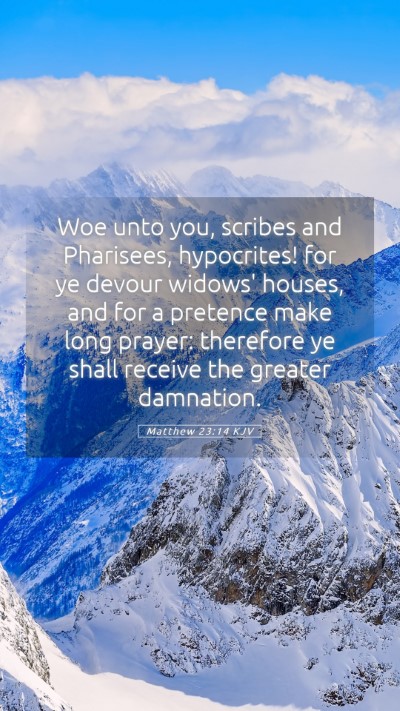Bible Verse Meaning and Interpretation of Matthew 23:14
In Matthew 23:14, we find a powerful message from Jesus addressing the scribes and Pharisees. This verse reads:
"Woe unto you, scribes and Pharisees, hypocrites! for ye devour widows' houses, and for a pretense make long prayer: therefore ye shall receive the greater damnation."
Summary of Matthew 23:14
This verse reveals the hypocrisy and moral failures of the religious leaders of Jesus' time. They outwardly appear pious and devout, yet their actions betray their true nature, as they exploit the vulnerable, such as widows. The consequence of their actions is severe, as they face greater condemnation due to their pretense and exploitation.
Key Themes in Matthew 23:14
- Hypocrisy: The verse emphasizes the contrast between the appearance of righteousness and actual deeds.
- Exploitation of the Vulnerable: The reference to devouring widows' houses illustrates the wickedness of taking advantage of those in need.
- Judgment: The declaration of "greater damnation" serves as a grim warning of the accountability faced by those in positions of spiritual authority who mislead others.
Commentary Insights
Let's delve deeper into the interpretations provided by notable commentaries:
Matthew Henry's Commentary
Matthew Henry points out that the Pharisees were notorious for their ritualistic prayers and religious practices, which were often mere performances. He emphasizes that their prayers were not sincere; instead, they were tools used to mask their greedy intentions—specifically regarding how they handled the estates of widows.
Albert Barnes' Notes
Albert Barnes provides insight into the cultural and historical context of the verse. He explains that in Jewish society, care for widows was a significant part of religious duty, and the scribes' failure to assist in this matter underscores their moral degradation. Barnes notes that their long prayers were a show to gain respect, but their actions depicted a stark deviation from the spirit of true religion.
Adam Clarke's Commentary
Adam Clarke stresses the severity of the woe pronounced by Jesus. He explores the meaning of 'damnation' as it applies here, suggesting it refers to a form of guilt that will lead the Pharisees to be judged more harshly. Clarke emphasizes that religious leaders bear the weight of a greater responsibility due to their influence and the impact of their hypocrisy on the souls of others.
Understanding Scripture: Application and Reflection
As we seek to interpret and understand the deeper implications of Matthew 23:14, it is crucial to reflect on how this scripture applies to our lives today. Here are some key points for personal contemplation:
- Examine Areas of Hypocrisy: Think about how we might present ourselves in a certain light while our actions may not align.
- Care for the Vulnerable: Reflect on our responsibilities toward those in need, ensuring that we do not exploit or neglect them.
- Recognize Spiritual Authority: Acknowledge the weight of influence we have on others and strive to lead with integrity and sincerity.
Related Cross References
- Luke 20:47: "Which devour widows' houses, and for a show make long prayers: the same shall receive greater damnation."
- James 1:27: "Pure religion and undefiled before God and the Father is this, To visit the fatherless and widows in their affliction, and to keep himself unspotted from the world."
- Proverbs 22:16: "He that oppresseth the poor to increase his riches, and he that giveth to the rich, shall surely come to want."
Conclusion
The meaning of Matthew 23:14 serves as a poignant reminder of the necessity for authenticity in faith and action. It calls us to evaluate our behaviors and attitudes, aligning them with the teachings of Jesus. By studying this verse and its commentary, we embrace deeper Bible verse understanding and are better equipped for Bible study insights, fostering growth in our spiritual journeys.


